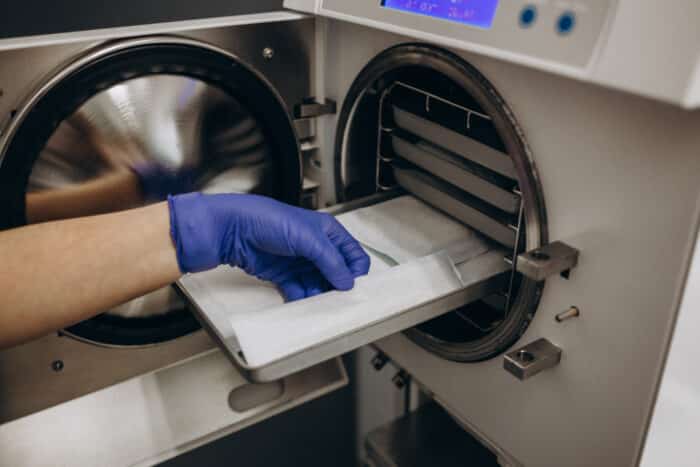If you’re here, you might be interested in entering the world of sterile processing and might be confused about the various training schools, and which to choose.
We understand your dilemma, with the amount of information out there. And we’re here to simplify it for you.
Picture this: the backbone of every hospital or medical facility is its sterile processing team. These heroes ensure that the medical instruments used are sterile, clean, and ready for action, preventing any infections or mishaps.
But before these technicians of sanitation can work their magic, they need top-notch training from specialized schools.
In this article, we will dive into the basics of sterile processing, the types of schools you can enroll in, their length, and how to pick the right one for you.
So, grab a seat, and let’s get started!
Who are Sterile Processing Technicians? And What Do They Do?
Sterile processing technicians are essential healthcare professionals responsible for ensuring that medical instruments, equipment, and supplies are cleaned, sterilized, and maintained to the highest standards of hygiene and safety.
Their primary focus is on preventing infections and ensuring patient safety by following protocols to sterilize and prepare medical tools for use in surgeries, procedures, and patient care.
Read: What is a Sterile Processing Technician
What Does a Sterile Processing Technician Do?
Here is a list of their day-to-day duties:
Cleaning and Sterilization:
Thoroughly clean, disinfect, and sterilize medical instruments and equipment to ensure they are free from contaminants and safe for use in medical procedures.
Equipment Inspection:
Carefully inspect instruments for damage or defects, ensuring they are in proper working condition before sterilization and use.
Assembling and Packaging:
Assemble and package sterilized instruments into sets or trays, following strict protocols to maintain sterility and organization.
Sterilization Techniques:
Utilize various sterilization methods such as steam, gas, and chemical processes, adhering to industry standards and guidelines.
Inventory Management:
Maintain inventory levels of sterile supplies, restocking as needed to ensure availability for medical procedures.
Quality Control:
Monitor and record sterilization and cleaning processes, maintaining detailed documentation to ensure compliance with regulations and standards.
Collaboration:
Work closely with surgical and medical staff to provide them with the necessary sterile instruments and equipment, supporting seamless patient care.
Adherence to Safety Procedures:
Follow strict safety protocols and procedures to protect themselves and others from exposure to biohazards and infectious materials.
Types of Sterile Processing Technician Schools
Now that you know in detail about these heroes who work in the background of any healthcare facility, you might be wondering about the type of education and training schools available.
Let us help you with that.
There are three main ways to complete your sterile processing technician training, such as:
- Associate Degree – These are usually offered by technical universities and colleges, and last up to 2 years, offering a comprehensive education with hands-on practical experience.
- Certificate/Diploma Programs – Offered by community colleges and trade schools, certificate/diploma programs usually last up to a year or 12 months.
- Online Training Programs – Online programs are usually offered by accredited institutions, and can be completed within a few months, ranging from 4 to 6 months. This is the most recommended method of completing your sterile processing technician training since it offers several benefits.
See: Best Online Sterile Processing Course
Sterile Processing Technician Training School Length
If you’re considering a career as a sterile processing technician, you might be curious about the duration of the training programs we mentioned in the previous section.
The length of the program varies based on the type of sterile processing technician training you opt for.
There are primarily three types of training programs available:
- Associate Degrees – Typically takes 2 years to complete
- Certificate/Diploma Programs – Typically spanning 12 months
- Online Sterile Processing Programs – Typically taking 4 to 6 months
It’s important to note that while these programs have set durations, the timeline could be extended if additional hands-on training, such as internships or externships, is required.
Sterile Processing Technician Training School Cost
Now, let’s answer the main question you might be curious about, how much do these programs cost?
Let us take a look.
- Associate Degrees – Tuition fees range from $10,000 to $30,000
- Certificate/Diploma Programs – Tuition fees range from $5,000 to $8,000
- Online Sterile Processing Programs – Tuition fees can be up to $3,000
By looking at the above-mentioned figures, it might be evident that online sterile processing technician training programs are the cheapest and best alternative for students. This is because there is no fuss involving undertaking any financial aid in the form of student debt.
Is Going To School Important To Become a Sterile Processing Technician?
Where sterile processing technician training is concerned, one question frequently arises among aspiring individuals: do you have to go to school to be a sterile processing technician?
In brief, the answer is mostly a yes.
In the field of sterile processing technician, most employers have a preference, if not a requirement, for candidates who have completed formal training in sterile processing and have acquired certification.
These training programs are offered through vocational schools, community colleges, and healthcare institutions and they help you gain the necessary knowledge and practical skills needed for the role.
Achieving certification—obtained through recognized bodies like the CRCST (Certified Registered Central Service Technician) certification, offered by the International Association of Healthcare Central Service Materiel Management (IAHCSMM) serves as validation of your proficiency and dedication. It can also broaden your job prospects and potentially lead to good earning opportunities.
Read more: Certified Sterile Processing Technician
How To Choose the Right Training School for Sterile Processing Technician Training
Onto the most important aspect of sterile processing technician training: picking the right type of training program or school.
This is the most essential step as it sets the foundation for becoming a successful sterile processing technician as the ideal program will equip you with the right knowledge and skill set.
Now, you might be wondering how to choose a training program that is the best suited for you. Let us help you with that.
Consider these key factors when choosing a training program:
1. Cost-Efficiency: An important aspect to consider is the program’s affordability. Opting for a more budget-friendly option could be the wisest choice for you since you won’t need to undertake the burden of any student debt.
2. Training Duration: A training program that allows faster completion of your course and allows for earlier entry into the workforce. Look into online programs that can conclude your training in as little as a few months.
3. Accreditation: Ensure the program you’re eyeing holds legitimate accreditation. Accredited programs align with essential educational standards, which prepare you for your future role as a sterile processing technician.
4. Online vs. On-Site Learning: Some individuals prefer the flexibility of online learning, while others prefer the structure of in-person classes. Online programs often offer faster completion, cheaper courses, and flexible learning schedules, all of which can be advantageous.
5. Externship Opportunities: Externships, which usually take place after you complete your training program, are invaluable for hands-on experience and practical application of skills. Ensure your chosen program includes an externship opportunity; many online programs integrate this into their curriculum.
Now that you’re aware of what to seek in a sterile processing tech training program, you might be wondering if there’s even a program out there that meets all these standards.
Well, yes there is!
Introducing:
PREPPY’S ONLINE STERILE PROCESSING TECHNICIAN TRAINING PROGRAM –
This program not only meets the all of criteria but exceeds them, and how.
Here’s how Preppy’s program ticks all the right boxes:
Accredited Training:
Preppy collaborates with a nationally recognized Accredited Institution to provide a Certified Sterile Processing Technician Program. This accreditation ensures rigorous training standards and credibility in the industry.
Institutional Certification:
Upon completion, Preppy’s accredited program awards you a Certificate of Completion from the Accredited Institution, which enhances your resume and demonstrates your credibility to potential employers.
Cost-Effective:
Worried about expenses? Leave that at the door. Preppy offers one of the most affordable training programs for sterile processing technicians, avoiding the burden of hefty student loans or financial aid.
Flexible Online Learning:
Preppy’s program offers entirely self-paced online classes, which means access to course materials anytime, anywhere—fitting into your schedule and lifestyle.
Preparation for National Certification:
Going beyond the basics, Preppy prepares you for national certification exams like the CRCST certification exam after completing your training.
Quick Completion in 4 Months:
Want to enter the workforce ASAP? With Preppy, complete your training in just four months, and start your career sooner.
Externship Opportunities:
Hands-on practice is essential, and Preppy understands that. They provide externship opportunities post-course completion, helping you with real-world application of your skills in healthcare settings before professional entry.
FREE Laptop:
Enroll with Preppy and receive a free laptop, yours to keep even after completing the program—an added benefit to your learning journey.
24/7 Support:
No need to worry about your doubts not being cleared Preppy assigns you a dedicated Student Coordinator and offers round-the-clock support, ensuring assistance whenever you need it, day or night.
Also see: Sterile Processing Technician Certification
Related Resources:
- Travel Sterile Processing Technician
- How to Become a Sterile Processing Technician
- Sterile Processing Technician Salary
- Sterile Processing Technician Job Description
- Sterile Processing Technician Requirements
- Sterile Processing Technician Resume
- Sterile Processing Technician vs. Surgical Technologist
- Sterile Processing Technician Training
- Sterile Processing Technician Course
- Sterile Processing Technician Training Program Cost
- CRCST Certification
Related Articles
-
How to Be Successful in College in 2022 – 7 Simple Tips to Succeed
-
How Do Scholarships Work? Read This First…Truth is Shocking
-
7 Best College Majors 2024: What Should I Major In?
-
How to Choose a College – 10 Things You Must Consider in 2024
-
Why Go to College? Top 13 Benefits for Adult Students in 2022
-
Top 5 Best Alternatives to Community College for 2024








